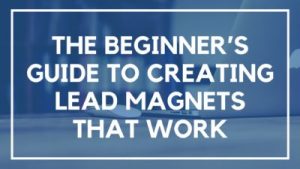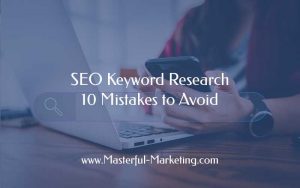You’re thinking it’s time to hire a marketing person or team to start getting some new leads in the door and expand your business. This could be, in a lot of ways, a turning point for the business – a make it or break it scenario. Read on for some important questions to consider, first.
Is My Sales Team Ready for New Business?
Many successful businesses are built on referrals, which then become repeat business. This is probably one of the most common ways to generate sales initially. Finally you’re at the point where you hire an inside sales person, or team, to field incoming repeat customers and leads. This is great, until you add digital marketing to the mix and you’re (hopefully) now generating brand new digital leads.
Dealing with new leads requires a different skillset from your salesperson or team than taking orders from repeat customers.
With marketing, you’ll be getting leads within different stages of the buyer journey, and they will require an appropriate sales technique to nurture into paying customers.
This is probably the number one mistake I have seen with expanding businesses…bringing in a marketing team without hiring a qualified sales team to field the new leads. This will pretty much always lead to frustration and failure.
What will most likely happen in this scenario is, you will be spending money on generating qualified digital leads, but losing them because your salesperson doesn’t know how to handle new business. Sales will blame it on marketing, saying marketing is generating leads they can’t close, and marketing will point to sales wondering why they are not able to close hot leads.
Overcoming this issue: Create a plan. If you’re ready to hire a marketing team, assess whether you have it in your budget to bring on a solid salesperson who will be the driving force in converting the new leads. If you are able to afford bringing on a marketing manager and salesperson, make sure to set goals and expectations right away – it’s ok to ask your marketing manager and salesperson to work together to come up with these goals on their own, and present to you, if you are not sure what they should be. You could accomplish this in the interview process.
Making sure your digital marketing team and sales team are in sync is absolutely critical to the success of your expansion.
Should I Focus on Outbound or Inbound Marketing First?
Your style here will depend on where you are with your current revenue. If you have a steady stream of cashflow, and a constant source of repeat business – with your primary reason to hire a marketing person or team being expansion – you can skip pay per click (PPC), retargeting, display and other forms of outbound marketing. You are in the luxurious position to really dive down into inbound marketing and work on building out content to draw in the best kinds of leads, ones motivated to learn more about you and buy from you.
If you want results fast, you’ll have to be ready to pay for them.
If your goal is to quickly ramp up your sales, hit revenue targets, plug holes in your revenue stream, go after an unfamiliar niche vertical, fill a seasonal gap or a combination of those – you will want to primarily focus on outbound marketing, such as PPC.
Reason for this is, organic and/or inbound marketing takes time to build. It’s no mystery that by developing quality content and positioning your company on the forefront of industry leadership in your niche typically yields the best leads. Whereas PPC and paid social advertising are “quick wins” — SEO, content, email, organic social, take time to develop.
The best solution is a hybrid, where you initially put some money into PPC, while you have someone start to build your organic strategy. The reason you want to do this is simple: organic leads are better and cost less in the long run.
Overcoming this issue: If you and your investors are satisfied with the current revenue, and you expect to hit projections for the next year without any marketing, this is a great time to bring on someone to help you build your organic marketing strategy. If you need new leads in the pipeline NOW, you’ll want to opt for the more outbound approach of paid digital marketing.
Do I Have the Budget for Marketing?
You’ve made the decision to go with PPC, and focus on social media and content and email marketing. This is a great strategy, but it comes at a cost. Typically, you will allocate a majority of your marketing budget to PPC, depending on how competitive your industry is. But there are costs associated with all types of marketing efforts – it’s a pay to win game these days. The typical digital marketing costs for a small business or start-up will go in the following, descending order from most expensive to least expensive:
- Marketing and Sales Salaries
- Paid Search / Display / Retargeting
- Content Distribution
- Social
- Email Marketing
Results, especially in PPC, largely depend on 1. the quality of your PPC specialist and 2. on the budget. You cannot pause PPC for a month and pick it back up like nothing happened. Campaigns take time to set up and work best when you have data to analyze over time. Any disruption to a marketing budget can lead to very poor results in the short term.
PPC requires a constant, steady budget feed to succeed.
Overcoming this issue: Figure out exactly how much of a budget you have to allocate to marketing efforts before you bring people on board to do work. There’s nothing worse than bringing in a PPC expert and having them sit idle because you didn’t anticipate an expense which wiped out the PPC budget for the month. PPC is the most extreme case, but marketing is about consistency so no matter if it’s advertising on social media, building quality backlinks, distributing content — make sure you can afford it. A good practice is to ask the marketing person you’re interviewing how much they’d need to get going. This question can’t always be answered accurately until more information is provided, but an experienced marketing manager can give you a ballpark figure.
Are My Expectations Realistic?
As a marketer, I prefer to think of myself as more of a scientist and less a magician. Typically, marketers do not pull leads out of a magic hat or have any “tricks” up their sleeve. In contemporary marketing, transparency is key. Marketing does occasionally benefit from a stroke of luck, but typically, with research, analysis and synthesis you can nail down a strategy which will work for your vertical, channels and content type.
That said, hiring a marketing specialist or team probably won’t help you double your sales overnight. Results vary depending on a lot of factors, but typically outbound will yield some results right off the bat, and inbound can take up to six months to show, real measurable progress.
Too often I find that owners’ vision doesn’t align with what’s possible given a set amount of resources, whether they are manpower or budget.
Overcoming this issue: When you hire a marketing person or team, make sure to expressly state why you’re hiring them and what your expectations are in the next three months, six months, one year. If possible, have numbers ready. The best case scenario is one where you know you currently need X amount of leads to hit your revenue target for the next six months so you want to scale it. Let’s say you want to increase the amount of leads by 5% in the first month. Essentially, the more specific you can get with what you would like to accomplish, the happier everyone will be in the long run, when it comes time to talk results. Don’t be afraid to ask someone what mix of channels they would use to achieve this goal.
I find that too often, in interviews with me, companies are so focused on figuring out what I know and what my experience is that they forget to ask me specific questions about whether I can actually help them or not. A good marketing professional will always be able to give you at least some idea on how they would start off on achieving the goals you set for them.
Do I Hire a Marketing Assistant or a Marketing Manager?
There are obviously more job titles than this, but these are the ones I see advertised most commonly, so we’ll identify these and focus on them, for now. This is not only a budget question — even if you can afford to hire a manager you may not necessarily need one – at the moment.
A marketing assistant will typically be someone just out of college or with up to three years worth of experience in marketing. This person will typically be able to execute some basic marketing tasks, such as proofing content, creating client presentation decks, manage your website, run your social media channels, maybe do some light web and/or graphic design.
A marketing manager will be someone with more than three years of experience and will come with some knowledge of not just how to execute, but some up with new ideas and strategies. An experienced marketing manager will often know which channels work best for which industry or vertical, they will have an idea of a budget that they’d need to get things moving, they’ll have not only hands-on experience doing your digital marketing but can easily scale up to managing outside agencies, if you decide to outsource some of your marketing efforts.
Overcoming this issue: Ask yourself whether you are looking to have this employee develop and grow slowly with your organization or come in and take over marketing efforts and build their own team within the foreseeable future? Both of these have advantages and disadvantages. A marketing manager without a budget and a team to manage within a short timeframe may become disinterested, so if you have a limited budget and can afford room for someone to grow on the job, a marketing assistant would be a good fit. Conversely, if you hire a marketing assistant to do a marketing manager’s job they can find themselves quickly overwhelmed by having to research things an experienced marketing manager would already know.
Should I Hire a Consultant or a Full-time Employee?
In a sense, you can use outsourcing your business’ digital marketing to and agency or freelancer to educate yourself better on what’s possible for your business, from a marketing standpoint. That way, when you’re ready, you will be better armed to make a good decision about who to hire full-time and of what they should be capable.
A full-time employee also has major advantages. For one, since you will guarantee-ably be their only client you will know this person is fully dedicated to prioritizing your needs first. Additionally, a full-time employee may find themselves more passionate about your business, especially if they are included in the decision-making process, work on-site, and/or have even a limited amount of equity in your company. Finally, a full-time employee will likely be more versatile, in terms of pivoting from project to project, multi-tasking and handling other important aspects of your business, which you wouldn’t be able to get from an agency.
Overcoming this issue: If you need the power of a marketing manager but can only afford a marketing assistant, you might consider outsourcing your efforts. You might also consider outsourcing initially so you can get an idea of what works and what doesn’t, without the burden of bringing on a full-time employee.
Originally posted on the Winning Marketing blog.
Business & Finance Articles on Business 2 Community(43)








